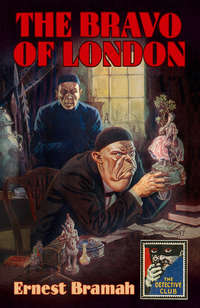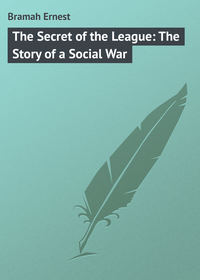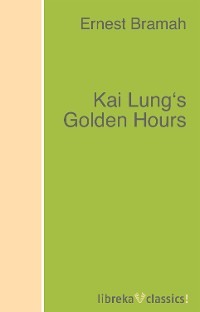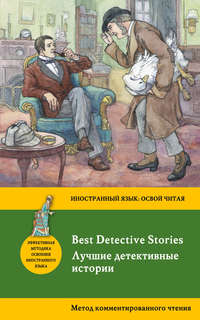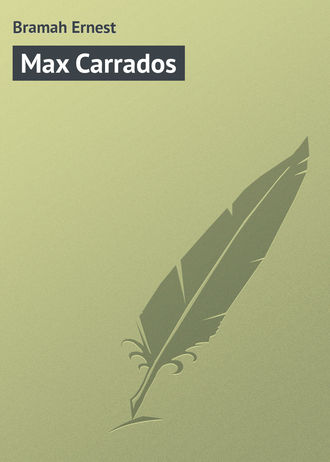 полная версия
полная версияMax Carrados
Mr Carlyle committed himself to a dubious monosyllable. Carrados leaned forward a little.
“All these circumstances formed a coincidence of pure chance. Is it not conceivable, Louis, that an even more remarkable series might be brought about by design?”
“Our tawny friend?”
“Possibly. Only he was not really tawny.” Mr Carlyle’s easy attitude suddenly stiffened into rigid attention. “He wore a false moustache.”
“He wore a false moustache!” repeated the amazed gentleman. “And you cannot see! No, really, Max, this is beyond the limit!”
“If only you would not trust your dear, blundering old eyes so implicitly you would get nearer that limit yourself,” retorted Carrados. “The man carried a five-yard aura of spirit gum, emphasized by a warm, perspiring skin. That inevitably suggested one thing. I looked for further evidence of making-up and found it – these preparations all smell. The hair you described was characteristically that of a wig – worn long to hide the joining and made wavy to minimize the length. All these things are trifles. As yet we have not gone beyond the initial stage of suspicion. I will tell you another trifle. When this man retired to a compartment with his deed-box, he never even opened it. Possibly it contains a brick and a newspaper. He is only watching.”
“Watching the bookmaker.”
“True, but it may go far wider than that. Everything points to a plot of careful elaboration. Still, if you are satisfied – ”
“I am quite satisfied,” replied Mr Carlyle gallantly. “I regard ‘The Safe’ almost as a national institution, and as such I have an implicit faith in its precautions against every kind of force or fraud.” So far Mr Carlyle’s attitude had been suggestive of a rock, but at this point he took out his watch, hummed a little to pass the time, consulted his watch again, and continued: “I am afraid that there were one or two papers which I overlooked. It would perhaps save me coming again to-morrow if I went back now – ”
“Quite so,” acquiesced Carrados, with perfect gravity. “I will wait for you.”
For twenty minutes he sat there, drinking an occasional tiny cup of boiled coffee and to all appearance placidly enjoying the quaint atmosphere which Mr Mehmed had contrived to transplant from the shore of the Persian Gulf.
At the end of that period Carlyle returned, politely effusive about the time he had kept his friend waiting but otherwise bland and unassailable. Anyone with eyes might have noticed that he carried a parcel of about the same size and dimensions as the deed-box that fitted his safe.
The next day Carrados presented himself at the safe-deposit as an intending renter. The manager showed him over the vaults and strong-rooms, explaining the various precautions taken to render the guile or force of man impotent: the strength of the chilled-steel walls, the casing of electricity-resisting concrete, the stupendous isolation of the whole inner fabric on metal pillars so that the watchman, while inside the building, could walk above, below, and all round the outer walls of what was really – although it bore no actual relationship to the advertising device of the front – a monstrous safe; and, finally, the arrangement which would enable the basement to be flooded with steam within three minutes of an alarm. These details were public property. “The Safe” was a showplace and its directors held that no harm could come of displaying a strong hand.
Accompanied by the observant eyes of Parkinson, Carrados gave an adventurous but not a hopeful attention to these particulars. Submitting the problem of the tawny man to his own ingenuity, he was constantly putting before himself the question: How shall I set about robbing this place? and he had already dismissed force as impracticable. Nor, when it came to the consideration of fraud, did the simple but effective safeguards which Mr Carlyle had specified seem to offer any loophole.
“As I am blind I may as well sign in the book,” he suggested, when the manager passed to him a gummed slip for the purpose. The precaution against one acquiring particulars of another client might well be deemed superfluous in his case.
But the manager did not fall into the trap.
“It is our invariable rule in all cases, sir,” he replied courteously. “What word will you take?” Parkinson, it may be said, had been left in the hall.
“Suppose I happen to forget it? How do we proceed?”
“In that case I am afraid that I might have to trouble you to establish your identity,” the manager explained. “It rarely happens.”
“Then we will say ‘Conspiracy.’”
The word was written down and the book closed.
“Here is your key, sir. If you will allow me – your key-ring – ”
A week went by and Carrados was no nearer the absolute solution of the problem he had set himself. He had, indeed, evolved several ways by which the contents of the safes might be reached, some simple and desperate, hanging on the razor-edge of chance to fall this way or that; others more elaborate, safer on the whole, but more liable to break down at some point of their ingenious intricacy. And setting aside complicity on the part of the manager – a condition that Carrados had satisfied himself did not exist – they all depended on a relaxation of the forms by which security was assured. Carrados continued to have several occasions to visit the safe during the week, and he “watched” with a quiet persistence that was deadly in its scope. But from beginning to end there was no indication of slackness in the business-like methods of the place; nor during any of his visits did the “tawny man” appear in that or any other disguise. Another week passed; Mr Carlyle was becoming inexpressibly waggish, and Carrados himself, although he did not abate a jot of his conviction, was compelled to bend to the realities of the situation. The manager, with the obstinacy of a conscientious man who had become obsessed with the pervading note of security, excused himself from discussing abstract methods of fraud. Carrados was not in a position to formulate a detailed charge; he withdrew from active investigation, content to await his time.
It came, to be precise, on a certain Friday morning, seventeen days after his first visit to “The Safe.” Returning late on the Thursday night, he was informed that a man giving the name of Draycott had called to see him. Apparently the matter had been of some importance to the visitor for he had returned three hours later on the chance of finding Mr Carrados in. Disappointed in this, he had left a note. Carrados cut open the envelope and ran a finger along the following words: —
“Dear Sir, – I have to-day consulted Mr Louis Carlyle, who thinks that you would like to see me. I will call again in the morning, say at nine o’clock. If this is too soon or otherwise inconvenient I entreat you to leave a message fixing as early an hour as possible. to leave a message fixing as early an hour as possible.
Yours faithfully,
Herbert Draycott.”“P.S.– I should add that I am the renter of a safe at the Lucas Street depository. H. D.”
A description of Mr Draycott made it clear that he was not the West-End bookmaker. The caller, the servant explained, was a thin, wiry, keen-faced man. Carrados felt agreeably interested in this development, which seemed to justify his suspicion of a plot.
At five minutes to nine the next morning Mr Draycott again presented himself.
“Very good of you to see me so soon, sir,” he apologized, on Carrados at once receiving him. “I don’t know much of English ways – I’m an Australian – and I was afraid it might be too early.”
“You could have made it a couple of hours earlier as far as I am concerned,” replied Carrados. “Or you either for that matter, I imagine,” he added, “for I don’t think that you slept much last night.”
“I didn’t sleep at all last night,” corrected Mr Draycott. “But it’s strange that you should have seen that. I understood from Mr Carlyle that you – excuse me if I am mistaken, sir – but I understood that you were blind.”
Carrados laughed his admission lightly.
“Oh yes,” he said. “But never mind that. What is the trouble?”
“I’m afraid it means more than just trouble for me, Mr Carrados.” The man had steady, half-closed eyes, with the suggestion of depth which one notices in the eyes of those whose business it is to look out over great expanses of land or water; they were turned towards Carrados’s face with quiet resignation in their frankness now. “I’m afraid it spells disaster. I am a working engineer from the Mount Magdalena district of Coolgardie. I don’t want to take up your time with outside details so I will only say that about two years ago I had an opportunity of acquiring a share in a very promising claim – gold, you understand, both reef and alluvial. As the work went on I put more and more into the undertaking – you couldn’t call it a venture by that time. The results were good, better than we had dared to expect, but from one cause and another the expenses were terrible. We saw that it was a bigger thing than we had bargained for and we admitted that we must get outside help.”
So far Mr Draycott’s narrative had proceeded smoothly enough under the influence of the quiet despair that had come over the man. But at this point a sudden recollection of his position swept him into a frenzy of bitterness.
“Oh, what the blazes is the good of going over all this again!” he broke out. “What can you or anyone else do anyhow? I’ve been robbed, rooked, cleared out of everything I possess,” and tormented by recollections and by the impotence of his rage the unfortunate engineer beat the oak table with the back of his hand until his knuckles bled.
Carrados waited until the fury had passed.
“Continue, if you please, Mr Draycott,” he said. “Just what you thought it best to tell me is just what I want to know.”
“I’m sorry, sir,” apologized the man, colouring under his tanned skin. “I ought to be able to control myself better. But this business has shaken me. Three times last night I looked down the barrel of my revolver, and three times I threw it away… Well, we arranged that I should come to London to interest some financiers in the property. We might have done it locally or in Perth, to be sure, but then, don’t you see, they would have wanted to get control. Six weeks ago I landed here. I brought with me specimens of the quartz and good samples of extracted gold, dust and nuggets, the clearing up of several weeks’ working, about two hundred and forty ounces in all. That includes the Magdalena Lodestar, our lucky nugget, a lump weighing just under seven pounds of pure gold.
“I had seen an advertisement of this Lucas Street safe-deposit and it seemed just the thing I wanted. Besides the gold, I had all the papers to do with the claims – plans, reports, receipts, licences and so on. Then when I cashed my letter of credit I had about one hundred and fifty pounds in notes. Of course I could have left everything at a bank but it was more convenient to have it, as it were, in my own safe, to get at any time, and to have a private room that I could take any gentlemen to. I hadn’t a suspicion that anything could be wrong. Negotiations hung on in several quarters – it’s a bad time to do business here, I find. Then, yesterday, I wanted something. I went to Lucas Street, as I had done half-a-dozen times before, opened my safe, and had the inner case carried to a room… Mr Carrados, it was empty!”
“Quite empty?”
“No.” He laughed bitterly. “At the bottom was a sheet of wrapper paper. I recognized it as a piece I had left there in case I wanted to make up a parcel. But for that I should have been convinced that I had somehow opened the wrong safe. That was my first idea.”
“It cannot be done.”
“So I understand, sir. And, then, there was the paper with my name written on it in the empty tin. I was dazed; it seemed impossible. I think I stood there without moving for minutes – it was more like hours. Then I closed the tin box again, took it back, locked up the safe and came out.”
“Without notifying anything wrong?”
“Yes, Mr Carrados.” The steady blue eyes regarded him with pained thoughtfulness. “You see, I reckoned it out in that time that it must be someone about the place who had done it.”
“You were wrong,” said Carrados.
“So Mr Carlyle seemed to think. I only knew that the key had never been out of my possession and I had told no one of the password. Well, it did come over me rather like cold water down the neck, that there was I alone in the strongest dungeon in London and not a living soul knew where I was.”
“Possibly a sort of up-to-date Sweeney Todd’s?”
“I’d heard of such things in London,” admitted Draycott. “Anyway, I got out. It was a mistake; I see it now. Who is to believe me as it is – it sounds a sort of unlikely tale. And how do they come to pick on me? to know what I had? I don’t drink, or open my mouth, or hell round. It beats me.”
“They didn’t pick on you – you picked on them,” replied Carrados. “Never mind how; you’ll be believed all right. But as for getting anything back – ” The unfinished sentence confirmed Mr Draycott in his gloomiest anticipations.
“I have the numbers of the notes,” he suggested, with an attempt at hopefulness. “They can be stopped, I take it?”
“Stopped? Yes,” admitted Carrados. “And what does that amount to? The banks and the police stations will be notified and every little public-house between here and Land’s End will change one for the scribbling of ‘John Jones’ across the back. No, Mr Draycott, it’s awkward, I dare say, but you must make up your mind to wait until you can get fresh supplies from home. Where are you staying?”
Draycott hesitated.
“I have been at the Abbotsford, in Bloomsbury, up to now,” he said, with some embarrassment. “The fact is, Mr Carrados, I think I ought to have told you how I was placed before consulting you, because I – I see no prospect of being able to pay my way. Knowing that I had plenty in the safe, I had run it rather close. I went chiefly yesterday to get some notes. I have a week’s hotel bill in my pocket, and” – he glanced down at his trousers – “I’ve ordered one or two other things unfortunately.”
“That will be a matter of time, doubtless,” suggested the other encouragingly.
Instead of replying Draycott suddenly dropped his arms on to the table and buried his face between them. A minute passed in silence.
“It’s no good, Mr Carrados,” he said, when he was able to speak; “I can’t meet it. Say what you like, I simply can’t tell those chaps that I’ve lost everything we had and ask them to send me more. They couldn’t do it if I did. Understand, sir. The mine is a valuable one; we have the greatest faith in it, but it has gone beyond our depth. The three of us have put everything we own into it. While I am here they are doing labourers’ work for a wage, just to keep going … waiting, oh, my God! waiting for good news from me!”
Carrados walked round the table to his desk and wrote. Then, without a word, he held out a paper to his visitor.
“What’s this?” demanded Draycott, in bewilderment. “It’s – it’s a cheque for a hundred pounds.”
“It will carry you on,” explained Carrados imperturbably. “A man like you isn’t going to throw up the sponge for this set-back. Cable to your partners that you require copies of all the papers at once. They’ll manage it, never fear. The gold … must go. Write fully by the next mail. Tell them everything and add that in spite of all you feel that you are nearer success than ever.”
Mr Draycott folded the cheque with thoughtful deliberation and put it carefully away in his pocket-book.
“I don’t know whether you’ve guessed as much, sir,” he said in a queer voice, “but I think that you’ve saved a man’s life to-day. It’s not the money, it’s the encouragement … and faith. If you could see you’d know better than I can say how I feel about it.”
Carrados laughed quietly. It always amused him to have people explain how much more he would learn if he had eyes.
“Then we’ll go on to Lucas Street and give the manager the shock of his life,” was all he said. “Come, Mr Draycott, I have already rung up the car.”
But, as it happened, another instrument had been destined to apply that stimulating experience to the manager. As they stepped out of the car opposite “The Safe” a taxicab drew up and Mr Carlyle’s alert and cheery voice hailed them.
“A moment, Max,” he called, turning to settle with his driver, a transaction that he invested with an air of dignified urbanity which almost made up for any small pecuniary disappointment that may have accompanied it. “This is indeed fortunate. Let us compare notes for a moment. I have just received an almost imploring message from the manager to come at once. I assumed that it was the affair of our colonial friend here, but he went on to mention Professor Holmfast Bulge. Can it really be possible that he also has made a similar discovery?”
“What did the manager say?” asked Carrados.
“He was practically incoherent, but I really think it must be so. What have you done?”
“Nothing,” replied Carrados. He turned his back on “The Safe” and appeared to be regarding the other side of the street. “There is a tobacconist’s shop directly opposite?”
“There is.”
“What do they sell on the first floor?”
“Possibly they sell ‘Rubbo.’ I hazard the suggestion from the legend ‘Rub in Rubbo for Everything’ which embellishes each window.”
“The windows are frosted?”
“They are, to half-way up, mysterious man.”
Carrados walked back to his motor car.
“While we are away, Parkinson, go across and buy a tin, bottle, box or packet of ‘Rubbo.’”
“What is ‘Rubbo,’ Max?” chirped Mr Carlyle with insatiable curiosity.
“So far we do not know. When Parkinson gets some, Louis, you shall be the one to try it.”
They descended into the basement and were passed in by the grille-keeper, whose manner betrayed a discreet consciousness of something in the air. It was unnecessary to speculate why. In the distance, muffled by the armoured passages, an authoritative voice boomed like a sonorous bell heard under water.
“What, however, are the facts?” it was demanding, with the causticity of baffled helplessness. “I am assured that there is no other key in existence; yet my safe has been unlocked. I am given to understand that without the password it would be impossible for an unauthorized person to tamper with my property. My password, deliberately chosen, is ‘anthropophaginian,’ sir. Is it one that is familiarly on the lips of the criminal classes? But my safe is empty! What is the explanation? Who are the guilty persons? What is being done? Where are the police?”
“If you consider that the proper course to adopt is to stand on the doorstep and beckon in the first constable who happens to pass, permit me to say, sir, that I differ from you,” retorted the distracted manager. “You may rely on everything possible being done to clear up the mystery. As I told you, I have already telephoned for a capable private detective and for one of my directors.”
“But that is not enough,” insisted the professor angrily. “Will one mere private detective restore my #6000 Japanese 4-1/2 per cent. bearer bonds? Is the return of my irreplaceable notes on ‘Polyphyletic Bridal Customs among the mid-Pleistocene Cave Men’ to depend on a solitary director? I demand that the police shall be called in – as many as are available. Let Scotland Yard be set in motion. A searching inquiry must be made. I have only been a user of your precious establishment for six months, and this is the result.”
“There you hold the key of the mystery, Professor Bulge,” interposed Carrados quietly.
“Who is this, sir?” demanded the exasperated professor at large.
“Permit me,” explained Mr Carlyle, with bland assurance. “I am Louis Carlyle, of Bampton Street. This gentleman is Mr Max Carrados, the eminent amateur specialist in crime.”
“I shall be thankful for any assistance towards elucidating this appalling business,” condescended the professor sonorously. “Let me put you in possession of the facts – ”
“Perhaps if we went into your room,” suggested Carrados to the manager, “we should be less liable to interruption.”
“Quite so; quite so,” boomed the professor, accepting the proposal on everyone else’s behalf. “The facts, sir, are these: I am the unfortunate possessor of a safe here, in which, a few months ago, I deposited – among less important matter – sixty bearer bonds of the Japanese Imperial Loan – the bulk of my small fortune – and the manuscript of an important projected work on ‘Polyphyletic Bridal Customs among the mid-Pleistocene Cave Men.’ To-day I came to detach the coupons which fall due on the fifteenth, to pay them into my bank a week in advance, in accordance with my custom. What do I find? I find the safe locked and apparently intact, as when I last saw it a month ago. But it is far from being intact, sir. It has been opened; ransacked, cleared out. Not a single bond; not a scrap of paper remains.”
It was obvious that the manager’s temperature had been rising during the latter part of this speech and now he boiled over.
“Pardon my flatly contradicting you, Professor Bulge. You have again referred to your visit here a month ago as your last. You will bear witness of that, gentlemen. When I inform you that the professor had access to his safe as recently as on Monday last you will recognize the importance that the statement may assume.”
The professor glared across the room like an infuriated animal, a comparison heightened by his notoriously hircine appearance.
“How dare you contradict me, sir!” he cried, slapping the table sharply with his open hand. “I was not here on Monday.”
The manager shrugged his shoulders coldly.
“You forget that the attendants also saw you,” he remarked. “Cannot we trust our own eyes?”
“A common assumption, yet not always a strictly reliable one,” insinuated Carrados softly.
“I cannot be mistaken.”
“Then can you tell me, without looking, what colour Professor Bulge’s eyes are?”
There was a curious and expectant silence for a minute. The professor turned his back on the manager and the manager passed from thoughtfulness to embarrassment.
“I really do not know, Mr Carrados,” he declared loftily at last. “I do not refer to mere trifles like that.”
“Then you can be mistaken,” replied Carrados mildly yet with decision.
“But the ample hair, the venerable flowing beard, the prominent nose and heavy eyebrows – ”
“These are just the striking points that are most easily counterfeited. They ‘take the eye.’ If you would ensure yourself against deception, learn rather to observe the eye itself, and particularly the spots on it, the shape of the fingernails, the set of the ears. These things cannot be simulated.”
“You seriously suggest that the man was not Professor Bulge – that he was an impostor?”
“The conclusion is inevitable. Where were you on Monday, Professor?”
“I was on a short lecturing tour in the Midlands. On Saturday I was in Nottingham. On Monday in Birmingham. I did not return to London until yesterday.”
Carrados turned to the manager again and indicated Draycott, who so far had remained in the background.
“And this gentleman? Did he by any chance come here on Monday?”
“He did not, Mr Carrados. But I gave him access to his safe on Tuesday afternoon and again yesterday.”
Draycott shook his head sadly.
“Yesterday I found it empty,” he said. “And all Tuesday afternoon I was at Brighton, trying to see a gentleman on business.”
The manager sat down very suddenly.
“Good God, another!” he exclaimed faintly.
“I am afraid the list is only beginning,” said Carrados. “We must go through your renters’ book.”
The manager roused himself to protest.
“That cannot be done. No one but myself or my deputy ever sees the book. It would be – unprecedented.”
“The circumstances are unprecedented,” replied Carrados.
“If any difficulties are placed in the way of these gentlemen’s investigations, I shall make it my duty to bring the facts before the Home Secretary,” announced the professor; speaking up to the ceiling with the voice of a brazen trumpet.
Carrados raised a deprecating hand.
“May I make a suggestion?” he remarked. “Now; I am blind. If, therefore – ?”
“Very well,” acquiesced the manager. “But I must request the others to withdraw.”
For five minutes Carrados followed the list of safe-renters as the manager read them to him. Sometimes he stopped the catalogue to reflect a moment; now and then he brushed a finger-tip over a written signature and compared it with another. Occasionally a password interested him. But when the list came to an end he continued to look into space without any sign of enlightenment.


